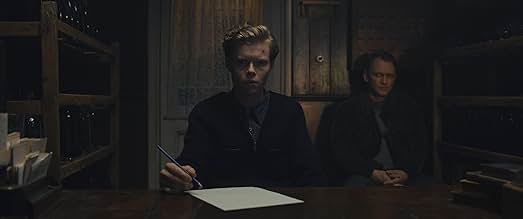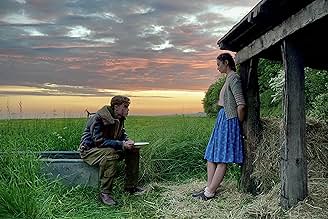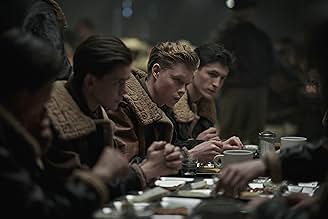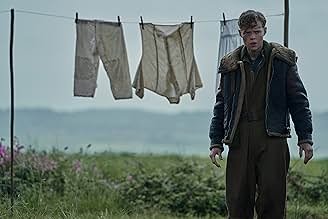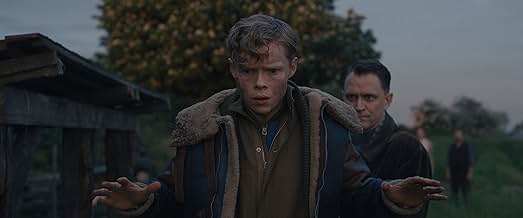A cinco milhas do solo e atrás das linhas inimigas, onze homens dentro de um bombardeiro Boeing B-17, conhecido como a "Fortaleza Voadora", lutam contra bandos de combatentes alemães.A cinco milhas do solo e atrás das linhas inimigas, onze homens dentro de um bombardeiro Boeing B-17, conhecido como a "Fortaleza Voadora", lutam contra bandos de combatentes alemães.A cinco milhas do solo e atrás das linhas inimigas, onze homens dentro de um bombardeiro Boeing B-17, conhecido como a "Fortaleza Voadora", lutam contra bandos de combatentes alemães.
- Ganhou 1 Primetime Emmy
- 7 vitórias e 25 indicações no total
Explorar episódios
Avaliações em destaque
This series takes the viewer from the B-17's flying from the US to Greenland and then on to England. BoB started with the training of Easy Co in GA. Pacific was similar to BoB. I felt like we missed out on knowing the characters here because they were just dumped on us and two of them were majors. I felt like I missed a couple of episodes and couldn't get caught up. I never got past the knowledge of the three or four main characters. The others all seemed alike and I couldn't differentiate them. The Tuskegee Airman seemed like an afterthought, but I'm glad they included them even though they weren't in the Eighth AF. Some people complain about CGI. I thought it was remarkable and I can't think of any other way it could have been done. Some reviewers have a problem with how the Brits were portrayed. I thought they were shown to be brave and resilient. Still, movies like this are a national treasure. The Eighth AF represents all our heroes who fought in the skies over Germany and Japan. The movie made sure the viewers knew Germany was pure evil in its intentions to conquer and subjugate the world. I would give BoB a 10, Pacific a 9, and this a solid 8.
Let me start off by saying I really enjoyed the series, it was really quite good. The acting is good, the sets and costumes and characters are phenomenal. I feel like they really show you the horrors of war. Certainly some of the best depiction of aerial Combat I've seen (I can't test to its accuracy but it certainly kept me at the edge of my seat). But it should have been better and ultimately it's nothing I haven't seen before in other World War II films and series. That being said this is top caliber.
The main con being that so many characters come in and come out of the series that it's hard to get attached to many of the newer ones, even though large parts of the stories are built around them. I understand that they were trying to be somewhat historically accurate and that's why they kept bringing a new characters, but it just got hard to tell who was who and even when I couldn't remember peoples names, I didn't feel too much for them because I only know them for a few episodes. Also, this is really nitpicky, but the opening tile sequence is a little much. I always say Apple TV has some of the coolest tile sequences for their shows, this one was boring and cliché, and it really shows just how highly the show thought of itself.
All in all, if someone told me then you very about World War II and wanted to watch a good movie/series about it I would recommend this one. However, if you're a war film buff, it's nothing you haven't already seen.
The main con being that so many characters come in and come out of the series that it's hard to get attached to many of the newer ones, even though large parts of the stories are built around them. I understand that they were trying to be somewhat historically accurate and that's why they kept bringing a new characters, but it just got hard to tell who was who and even when I couldn't remember peoples names, I didn't feel too much for them because I only know them for a few episodes. Also, this is really nitpicky, but the opening tile sequence is a little much. I always say Apple TV has some of the coolest tile sequences for their shows, this one was boring and cliché, and it really shows just how highly the show thought of itself.
All in all, if someone told me then you very about World War II and wanted to watch a good movie/series about it I would recommend this one. However, if you're a war film buff, it's nothing you haven't already seen.
Masters of the Air is a gripping and intense exploration of the air campaigns conducted by the Air Force during World War II. The series, a continuation of the tradition set by Band of Brothers and The Pacific, delves into the lives of the bomber crews who played a crucial role in the Allied victory over Nazi Germany. Across its episodes, the series captures the brutality of war, the camaraderie of men in battle, and the profound psychological effects of conflict. With its focus on air warfare, Masters of the Air offers a different perspective on World War II, illuminating the often-overlooked contributions and sacrifices of bomber pilots and crews.
One of the most compelling aspects of the series is its focus on the human experience of war. While the action sequences are breathtaking and provide a visceral representation of air combat, it is the intimate portrayal of the men aboard the bombers that elevates the series. The characters are given depth and complexity, with the series taking the time to explore their motivations, fears, and struggles. Whether it's the tension before a mission, the relief of survival, or the guilt of witnessing fellow airmen perish, the emotional weight of the show is palpable. The relationships between the men are at the heart of the story, and the series does an excellent job of portraying the bond formed by shared trauma.
From a thematic standpoint, Masters of the Air explores several important issues, including the dehumanizing effects of war, the fine line between heroism and survival, and the moral dilemmas faced by soldiers. One of the most striking themes is the psychological toll of the bombing campaigns. The men are tasked with delivering death and destruction from above, often targeting civilians. The series doesn't shy away from depicting the ethical ambiguity of their actions, and many of the characters struggle with the morality of their missions. This exploration of guilt and responsibility adds layers of complexity to the series, reminding viewers that even those who fight on the right side of history are not immune to the moral consequences of their actions.
The series excels in its technical execution, with the direction and cinematography capturing both the grandeur and horror of the air battles. The aerial combat sequences are breathtaking, filled with stunning visuals of bomber formations, enemy fighters, and the chaos of anti-aircraft fire. The use of CGI is impressive and realistic, enhancing the immersive experience of the air combat without distracting from the human drama. The production design and attention to historical detail are also remarkable, with the bombers, uniforms, and settings all meticulously recreated to provide an authentic period feel. The sound design is another standout element, with the roar of engines and the thunder of explosions providing a visceral sense of the danger these men faced.
Despite its many strengths, Masters of the Air is not without its flaws. One of the series' challenges is maintaining a consistent narrative momentum. The episodic structure, while allowing for character development, sometimes leads to pacing issues. Some episodes focus heavily on the action, while others slow down to explore the emotional aftermath of combat. This imbalance can make the series feel uneven at times, as the shifts in tone and focus occasionally disrupt the narrative flow. Additionally, while the show does an admirable job of fleshing out its main characters, some of the secondary characters feel underdeveloped, leaving certain relationships and subplots feeling incomplete.
The performances in the series are outstanding, with the cast delivering powerful portrayals of men under extreme pressure. The actors bring nuance to their roles, skillfully portraying the psychological toll of war. The lead performances stand out, particularly in moments of quiet reflection or emotional breakdown. The show's ability to balance large-scale action with intimate, character-driven moments is one of its greatest strengths, and much of that credit goes to the actors. Their portrayals of camaraderie, fear, and resilience feel authentic and deeply moving, grounding the series' epic scope in personal stories.
The editing and pacing of Masters of the Air are generally well-executed, although, as previously mentioned, some episodes struggle with pacing. The moments of tension during combat are perfectly timed, with the editing building suspense and intensity. However, the quieter, reflective scenes are occasionally drawn out, which can slow the overall rhythm of the show. That said, the slower moments are often necessary to give the characters room to breathe and for the audience to process the emotional gravity of the story. The series strikes a delicate balance between action and introspection, though not always perfectly.
One of the most impactful elements of Masters of the Air is its focus on the theme of survival. Unlike many war series that celebrate victory and heroism, this show emphasizes the arbitrary nature of survival in war. Men live or die based on luck as much as skill, and the randomness of death is a constant undercurrent throughout the series. This existential theme adds to the emotional weight of the show, as viewers are reminded that every successful mission comes at a high cost, and every surviving soldier carries the burden of those who did not make it back.
In terms of historical importance, Masters of the Air succeeds in shedding light on a crucial but often overlooked aspect of World War II. While ground combat is frequently depicted in films and series, the air war over Europe is less often explored. This series does an excellent job of illustrating the strategic significance of the air campaigns, as well as the personal cost borne by the men who flew the missions. The show also touches on the broader societal impact of the war, particularly the psychological scars left on the soldiers and their difficulty reintegrating into civilian life after the conflict.
In conclusion, Masters of the Air is a powerful and thought-provoking war drama that captures the bravery, trauma, and complexity of the air campaigns during World War II. The series excels in its performances, direction, and technical execution, offering a visually stunning and emotionally resonant portrayal of war. While it has some pacing issues and occasionally struggles to maintain narrative momentum, the series' strengths far outweigh its weaknesses. It stands as a fitting tribute to the men of the Eighth Air Force, highlighting their courage while also acknowledging the psychological toll of their service. In the broader landscape of war series, Masters of the Air holds a significant place, contributing to a deeper understanding of the human experience of war.
One of the most compelling aspects of the series is its focus on the human experience of war. While the action sequences are breathtaking and provide a visceral representation of air combat, it is the intimate portrayal of the men aboard the bombers that elevates the series. The characters are given depth and complexity, with the series taking the time to explore their motivations, fears, and struggles. Whether it's the tension before a mission, the relief of survival, or the guilt of witnessing fellow airmen perish, the emotional weight of the show is palpable. The relationships between the men are at the heart of the story, and the series does an excellent job of portraying the bond formed by shared trauma.
From a thematic standpoint, Masters of the Air explores several important issues, including the dehumanizing effects of war, the fine line between heroism and survival, and the moral dilemmas faced by soldiers. One of the most striking themes is the psychological toll of the bombing campaigns. The men are tasked with delivering death and destruction from above, often targeting civilians. The series doesn't shy away from depicting the ethical ambiguity of their actions, and many of the characters struggle with the morality of their missions. This exploration of guilt and responsibility adds layers of complexity to the series, reminding viewers that even those who fight on the right side of history are not immune to the moral consequences of their actions.
The series excels in its technical execution, with the direction and cinematography capturing both the grandeur and horror of the air battles. The aerial combat sequences are breathtaking, filled with stunning visuals of bomber formations, enemy fighters, and the chaos of anti-aircraft fire. The use of CGI is impressive and realistic, enhancing the immersive experience of the air combat without distracting from the human drama. The production design and attention to historical detail are also remarkable, with the bombers, uniforms, and settings all meticulously recreated to provide an authentic period feel. The sound design is another standout element, with the roar of engines and the thunder of explosions providing a visceral sense of the danger these men faced.
Despite its many strengths, Masters of the Air is not without its flaws. One of the series' challenges is maintaining a consistent narrative momentum. The episodic structure, while allowing for character development, sometimes leads to pacing issues. Some episodes focus heavily on the action, while others slow down to explore the emotional aftermath of combat. This imbalance can make the series feel uneven at times, as the shifts in tone and focus occasionally disrupt the narrative flow. Additionally, while the show does an admirable job of fleshing out its main characters, some of the secondary characters feel underdeveloped, leaving certain relationships and subplots feeling incomplete.
The performances in the series are outstanding, with the cast delivering powerful portrayals of men under extreme pressure. The actors bring nuance to their roles, skillfully portraying the psychological toll of war. The lead performances stand out, particularly in moments of quiet reflection or emotional breakdown. The show's ability to balance large-scale action with intimate, character-driven moments is one of its greatest strengths, and much of that credit goes to the actors. Their portrayals of camaraderie, fear, and resilience feel authentic and deeply moving, grounding the series' epic scope in personal stories.
The editing and pacing of Masters of the Air are generally well-executed, although, as previously mentioned, some episodes struggle with pacing. The moments of tension during combat are perfectly timed, with the editing building suspense and intensity. However, the quieter, reflective scenes are occasionally drawn out, which can slow the overall rhythm of the show. That said, the slower moments are often necessary to give the characters room to breathe and for the audience to process the emotional gravity of the story. The series strikes a delicate balance between action and introspection, though not always perfectly.
One of the most impactful elements of Masters of the Air is its focus on the theme of survival. Unlike many war series that celebrate victory and heroism, this show emphasizes the arbitrary nature of survival in war. Men live or die based on luck as much as skill, and the randomness of death is a constant undercurrent throughout the series. This existential theme adds to the emotional weight of the show, as viewers are reminded that every successful mission comes at a high cost, and every surviving soldier carries the burden of those who did not make it back.
In terms of historical importance, Masters of the Air succeeds in shedding light on a crucial but often overlooked aspect of World War II. While ground combat is frequently depicted in films and series, the air war over Europe is less often explored. This series does an excellent job of illustrating the strategic significance of the air campaigns, as well as the personal cost borne by the men who flew the missions. The show also touches on the broader societal impact of the war, particularly the psychological scars left on the soldiers and their difficulty reintegrating into civilian life after the conflict.
In conclusion, Masters of the Air is a powerful and thought-provoking war drama that captures the bravery, trauma, and complexity of the air campaigns during World War II. The series excels in its performances, direction, and technical execution, offering a visually stunning and emotionally resonant portrayal of war. While it has some pacing issues and occasionally struggles to maintain narrative momentum, the series' strengths far outweigh its weaknesses. It stands as a fitting tribute to the men of the Eighth Air Force, highlighting their courage while also acknowledging the psychological toll of their service. In the broader landscape of war series, Masters of the Air holds a significant place, contributing to a deeper understanding of the human experience of war.
I've been counting down the days to Masters of the Air ever since I saw the first trailer. Well, it's finally here and it definitely lives up to all the hype. This limited series will definitely be nominated for every major award there is. You can tell this was expensive to make. Like many have already pointed out it's brought to you by Tom Hanks and Steven Spielberg. While it's not quite as good as their other World War II series, Band of Brothers, it's still pretty darn good. The way this series shows all the struggles and humanity of war is brilliant. I've used the word a few times now because that's what this series is...brilliant. I can't say enough about the cast either. They do a great job pulling you into their world and make you really care for these characters. Don't miss this series.
I was quite excited by this new series with Spielberg and co at the helm. But after a few episodes the script took a turn for the worse, why belittle the RAF making out they are some toff graduates from Oxford or Cambridge, quite embarrassing really. Of course the Americans are the only heros in this, utter BS. Spielberg is a f?@king numpty. There were many brave men from all sides but as always the yanks saved the day single handedly where the RAF were buffoons. We all know the British have the best armed services in the world and between me and you the yanks are somewhat jealous, so they try and make themselves look better. Spielberg yawn off.
Você sabia?
- CuriosidadesFlight scenes were filmed in replica B-17s using technology known as The Volume (used on The Mandalorian (2019)). The B-17s were suspended 50 ft in the air on a gimbal inside a 360-degree stage of seamless LED panel screens and ceiling. Actors could therefore react to flak explosions, crashes and planes flying in real time as the gimbal simultaneously reacted to scenarios.
- Erros de gravaçãoThroughout the series the standard B-17F version is shown, but by early 1944 nearly all B-17s in the European Theatre had been upgraded to the B-17G version with the distinctive powered twin nose turret to help combat frontal assaults by the Luftwaffe.
- ConexõesFeatured in WatchMojo: Top 10 TV Shows of 2024 (So Far) (2024)
Principais escolhas
Faça login para avaliar e ver a lista de recomendações personalizadas
Detalhes
- Data de lançamento
- País de origem
- Idioma
- Também conhecido como
- Masters of the Air
- Locações de filme
- Empresas de produção
- Consulte mais créditos da empresa na IMDbPro
- Tempo de duração56 minutos
- Cor
- Mixagem de som
- Proporção
- 2.39:1
Contribua para esta página
Sugerir uma alteração ou adicionar conteúdo ausente

Principal brecha
What was the official certification given to Mestres do Ar (2024) in Germany?
Responda






